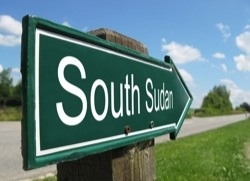
When flying into Juba – a sleepy and poor town in Southern Sudan that is located on the banks of the Nile River – it is hard to believe that it may become the capital of the newest nation in the world. The airport, the size of one for a very small municipality, is packed with people arriving and departing. Some are in western garb while others are in more traditional dress – women with elaborate headscarves and floral print dresses and men in white thawbs. Luggage and all manner of corded boxes and bags arrive from planes at the terminal by farm tractor and trailer, and are deposited on a dock where they are inspected by uniformed and stern looking customs officials, each armed with a piece of white chalk. After a cursory search of foreigners bags, and a more careful and demanding search of locals’, they mark and pass them on to travelers who exit the terminal and head toward the ranks of the ubiquitous SUVs that are the main means of transportation for international workers and businesspeople providing relief, development and political assistance to Southern Sudan.
In many ways, Juba is an overgrown village. It is composed of a rather dilapidated “downtown” with crumbling stores and street stalls, typical African markets, slums and a number of hotels and compounds that house the international community. The town lays claim to the only paved roads in the country. (During the wet months, the only way to get between towns and cities is to fly, as the roads are totally impassable.)
Along the road into town is the UN Compound, shacks, garbage, flying plastic bags, cows, goats and trucks of imported food and supplies that are the lifeblood for some of the poorest people in Africa. Thus began CDR Partner, Chris Moore’s consultancy in Southern Sudan on the development of land and property dispute resolution systems for the Southern Sudan Land Commission and UN Habitat.
Southern Sudan is currently part of the country of Sudan. In 1947 the Sudanese and British joined the Arab North and African South into one country. However, the marriage was not a peaceful one. From the time of Sudan’s independence in 1956, negative historical relationships and grievances, efforts to impose Islamic law, underdevelopment and discriminatory treatment of African Southerners by Arab Northerners resulted in two civil wars. The most recent one lasted more than 20 years, and resulted in the death of over 2.5 million people and over 5 million displaced.
In 2005, the North and South signed the Comprehensive Peace Agreement (CPA), which ended the violent conflict and allowed a period of 5 years for the country to stabilize and conduct a referendum on whether the South, a territory the size of the state of Texas and with an estimated population of roughly 8 million, would secede become independent. On January 9th 20011, citizens of Southern Sudan voted in a referendum to determine the final status of the South.
Among the most contentious issues between the North and South, and within the South itself, is land. The South has more than 200 ethnic groups. Historically, the vast majority of land is held by these groups, and administered by traditional authorities and customary law. During Northern rule, a significant amount of traditional land was nationalized. Concessions were issued without consultation or consent by local communities.
The civil war led to a breakdown of traditional land conflict resolution mechanisms between pastoralist groups and between pastoralist and agricultural communities. The peace resulted in the creation of new boundaries between states and counties, many of which were established with limited or no consultation with affected populations. Migration from rural to urban areas, and returns of refugees and internally displaced persons have, put pressures on municipalities and traditional communities to expand or relocate people. These changes have led to tensions between municipalities, urban residents and traditional landholders as competition for land increases.
To address the above problems and conflicts UN HABITAT, the UN agency focused on urban development and the resolution of land disputes, is partnering with the Southern Sudan Land Commission to provide technical assistance and develop dispute resolution mechanisms to resolve a range of land disputes. Some of the issues to be handled include – boundaries between states and counties, pastoralist-pastoralist land and water issues, pastoralist and agricultural community interface problems, municipal acquisition of traditional lands, land grabbing, urban development and removal of informal settlements, and resolution of cases that involve inter-ethnic land claims. CDR Partner, Christopher Moore is a member of the UN HABITAT team working on this issue.
In August, September and October, Moore traveled to Southern Sudan to conduct situation assessments, and awareness training on the design of dispute resolution systems. The trips involved consultations and training in Juba, puddle-jumper plane trips on UN Humanitarian Air Service to two state capitals during the rainy season, traveling on mud engulfed roads, sleeping in a tent and meeting many wonderful people dedicated to building a new Southern Sudan. To date he has worked with an international team to conduct and complete situation assessments on land disputes in Central and Western Equatoria and Jonglei States, presented a seminar for the Land Commission on Advanced Mediation Skills and Supporting Land Dispute Resolution Systems, and conducted a workshop for UN HABITAT and USAID on Post-Conflict Land Disputes: Systems for Prevention, Management and Resolution.
Moore is scheduled to return to Southern Sudan in early 2011 to conduct strategy design and planning workshops in three Southern Sudanese states, and assist the state governments to design and implement customized land dispute resolution systems. He will also conduct capacity building training programs to prepare state government officials and staff of non-governmental organizations in various dispute resolution procedures, negotiation and mediation. Several state-based dispute resolution systems are expected to be up and running by July, the date set for independence.


